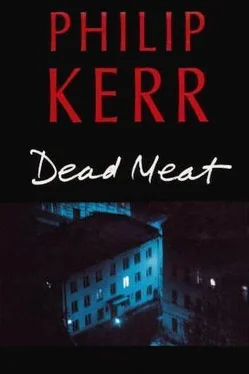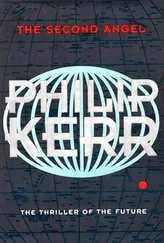‘Ah, I see.’ Grushko chuckled quietly. ‘Well, no need to be so bashful, Nikolai. We all know what that’s like.’
This was undoubtedly true. For several weeks now there had been a deficit of lavatory paper in all the state shops. A day or so before leaving Moscow I had seen someone on the Rozhdestvenska Street market offering toilet rolls at fifty roubles each. Fifty roubles. That was my mother’s weekly pension.
Grushko picked up a passport from the table. He turned the pages with the lugubrious air of an immigration official.
‘Belongs to the man in the boot,’ said Shelaeva.
Grushko nodded absently and then turned his attention to where one of her men was photographing an area of ground not far behind the Volga.
‘What’s happening over there?’
‘Some tyre tracks,’ she said. ‘There’s not much tread on them, as you might expect, so don’t even hope that we can make some kind of identification. And a couple of sets of footprints going between the two cars. My guess is that whoever shot Milyukin was already sitting in the back seat of the Volga when it arrived. He shot Milyukin and then he and the driver got out, shot the second man, and then walked back to the other car.’
Grushko wandered over to look at the car tracks.
‘Took their time leaving as well,’ he said. ‘Nothing panicky about these tyre tracks. These boys knew what they were about.’
Sasha had the rest of what was known from the local militia.
‘A local angler found the bodies at around seven o’clock this morning—’
Grushko grimaced. ‘I don’t know that I would want to fish in these waters,’ he said.
A keen angler myself, I said that I had been thinking that it looked like a pretty good spot. Grushko shook his head vigorously and pointed south at the horizon.
‘You can’t see it from here, but on the other side of the bay, that’s Sosnovy Bor.’
‘The nuclear reactor?’
He nodded. ‘You wouldn’t catch me fishing in these waters,’ he said ominously. ‘No telling what’s been dumped here over the years.’ He looked at Sasha, who continued with his information.
‘According to the local boys, the area is very popular with hunters,’ he said. ‘If anyone did hear those shots, I doubt they’d have thought it at all unusual.’
‘Yes,’ agreed Grushko. There’s elk round here, isn’t there?’
Sasha shook his head and shrugged.
‘They’ve checked with the GAI, and apparently the car is registered to—’ Sasha consulted his notebook and turned the page — ‘to Vaja Ordzhonikidze.’
‘Ordzhonikidze?’ said Nikolai. ‘That name hits a thumb. Isn’t he one of the Georgian team leaders?’
Grushko glanced at the passport he was still holding.
‘Not any more he isn’t.’ Catching my eye, Grushko added: ‘A year or so ago, we tried to sew a number on his jacket for racketeering. Only he had sharp scissors. And a lawyer by the name of Luzhin. That’s a name you’ll get to know. He only works for Mafia clients.’
‘What do you think, sir?’ asked Nikolai. ‘The Georgian, giving Milyukin a story?’
‘Well, that’s what it looks like,’ Grushko admitted. ‘Sasha, have the relatives been informed yet?’
‘No, sir.’
‘Then that’s our next job.’ He looked at me again and shrugged. ‘You’d better come along. If you’re going to find out about the Mafia, you need to study the science of bad news.’
We returned to St Petersburg and left Nikolai and Sasha to go in search of the Georgian’s nearest friend or relative. Grushko and I drove back to the Griboyedev Canal where, just a few hours earlier, he had pointed out the scene of Raskolnikov’s crime. He made no mention of this coincidence although from the expression on his face I had half an idea that he was thinking about it.
The Milyukins’ flat was in a dilapidated, pre-Revolutionary building on the opposite side of the canal from the mosaic front of a church that stood a little further north. Grushko parked the Zhiguli, thoughtfully removed the windscreen-wiper blades, which he tossed on to the floor of the car, and then led the way into the backyard. By a cheap, unpainted wooden door was a push-button combination lock; the sequence of numbers was not hard to work out thanks to the forgetful, or possibly mischievous, soul who had scratched it on to the adjacent brickwork.
‘It’s no wonder that there are so many burglaries,’ Grushko observed. He pressed the keys and, as he opened the door and mounted the narrow staircase, something scuttled away into the darkness. The steps were quite worn down as in some ancient Egyptian mausoleum and the dirty brown walls were daubed with appropriately primitive sentiments.
We climbed to the fourth floor, collected our breath with a quick cigarette and then rang the antiquated bell-pull. Somewhere the bell tolled as if from a distant church tower and for a moment I had a vision of myself as that hungry, Napoleon-fixated student, preparing to commit one murder in the delusion that a hundred others might be saved. The hunger was easy enough to imagine: since the previous night I hadn’t eaten much more than a piece of bread and a slice of cold meat. From the speed of my heartbeat you might have thought I was actually planning to go through with it.
After a minute or so we heard a key turn in the lock and the door opened as far as the sturdy chain would allow. The woman appearing in the gap was in her thirties, fair-haired and good-looking in a clever sort of way and wearing an expression that was worth a whole fistful of worry beads. Grushko flipped open his identity card.
‘Mrs Milyukin?’
‘It’s about my husband, isn’t it?’
‘Can we come in please?’
She closed the door, drew the chain and opened it once again, ushering us into the cluttered hallway of her communal apartment and then beyond, into the one large room that she and the man in the forest had called their home.
It was about nine square metres of space, with a double-size sofa bed, folded away, a shelving unit occupying one whole wall, a small coffee table, two armchairs and an enormous wardrobe. On the shelves were a large television set, a VCR and lots of books and videotapes, while on the table were the remains of a frugal meal. It was not a bad room by the average standards of Russian accommodation but at that particular moment I wished I could have been anywhere else. Mrs Milyukin folded her arms and braced herself to hear what she already knew in her bones.
‘I’m afraid I have bad news for you,’ Grushko said evenly. ‘Mikhail Mikhailovich Milyukin is dead.’
The dead man’s widow, whose name was Nina Romanovna, twitched convulsively and let out a deep sigh, like one who has died herself.
Instinctively I turned away. Drawing back the curtain for a moment I looked out of the window. Across the canal the sun touched the church’s highest cupola and turned this golden sphere into an imitation of itself that was almost too bright to look at directly. Probably Grushko could have endured the sight of it without flinching. By then he had already held the widow’s bitter eyes for what seemed like an eternity.
‘Well,’ she said finally, ‘that’s that.’
‘Not quite,’ said Grushko. ‘I regret to have to tell you that he was murdered. This officer and I have just come from the scene of the crime. There will have to be a formal identification, I’m afraid, but there’s no doubt that it’s him. And I will have to ask you some questions, Mrs Milyukin. It may seem insensitive — obviously you want to be alone right now — but the sooner I’m able to establish what were Mikhail Mikhailovich’s last movements, the sooner I’ll catch whoever is responsible.’
Читать дальше












